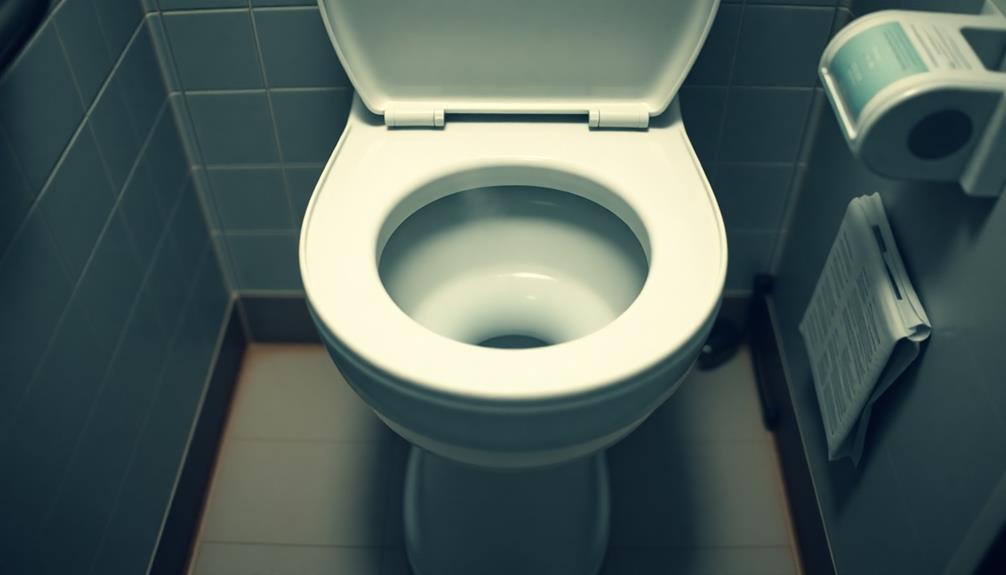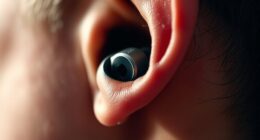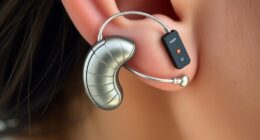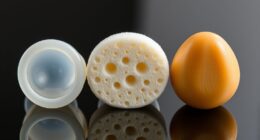If you ever smell mouse poop, you'll notice a strong ammonia-like odor, especially in small, enclosed spaces. This unpleasant scent is a mix of mouse urine and feces, which can indicate an infestation. Fresh droppings will smell sharper and stronger than older ones. You might find this odor in places like attics, kitchens, or cupboards. If you catch that smell, it's a good idea to check for droppings and take action since it could pose health risks. Keep an eye out for any signs, and you'll discover what to do next to keep your home safe!
Key Takeaways
- Mouse droppings emit a strong, ammonia-like odor, particularly noticeable in confined spaces.
- Fresh droppings have a more intense smell compared to older, dried droppings.
- The odor can serve as a territorial marker, indicating the presence of mice.
- Larger infestations produce a stronger smell due to increased droppings and nesting materials.
- Regular inspections are essential to catch the smell early and address potential health risks.
Introduction
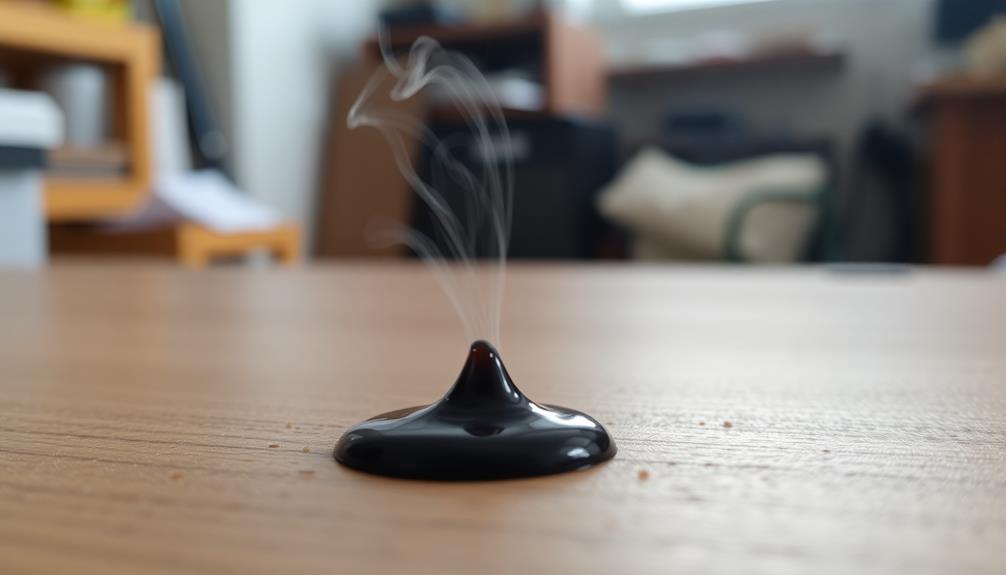
When you come across a foul smell in your home, it might signal the presence of mouse droppings. This strong odor, often described as ammonia-like, is especially noticeable in enclosed spaces like cupboards or basements where mice prefer to nest.
If you detect this smell, it's crucial to take immediate action. Fresh mouse droppings emit a more potent odor compared to older, drier ones, making it easier for you to spot active infestations.
The intensity of the smell can give clues about the size of the problem. A larger mouse population produces more droppings and urine, leading to a stronger odor. Detecting this smell early can help you address the issue before it gets out of hand.
Don't underestimate the health risks associated with mouse droppings, as they can carry harmful bacteria and allergens.
Once you notice this odor, it's time for immediate investigation and cleanup. Ensure you wear gloves and a mask to protect yourself during the process.
Taking prompt action not only helps keep your home safe but also prevents further infestations. Stay vigilant, and you can manage the situation effectively!
Description of the Smell
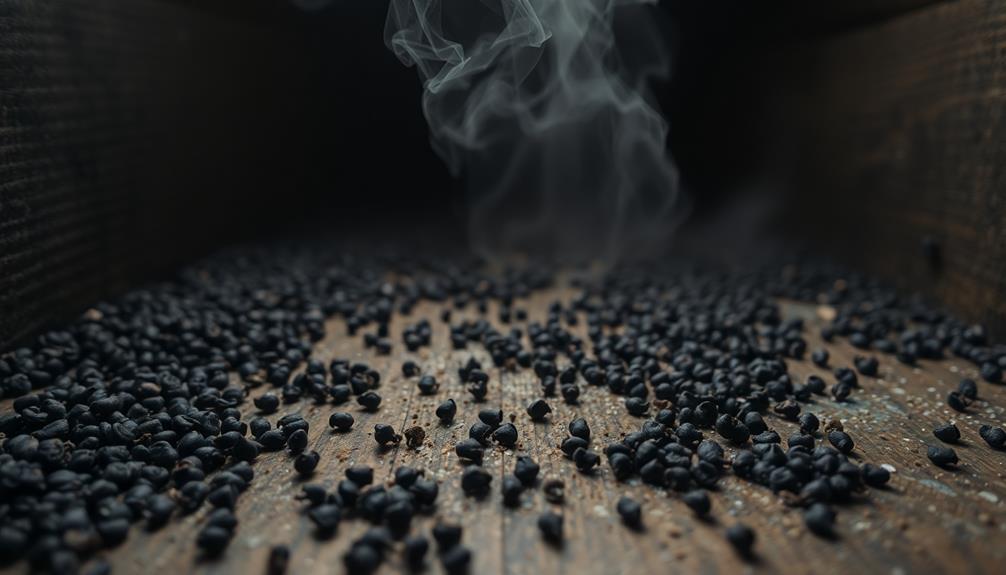
The smell of mouse droppings is unmistakably strong and can be quite overwhelming, particularly in confined areas. You might notice a distinct ammonia-like smell that hits your nose as soon as you enter a space where mice have been active.
This strong odor comes from a high concentration of urine mixed with feces, making it particularly potent in enclosed spaces like cupboards or attics where mice might be nesting. The smell can be so intense that it’s often compared to the pungent scent of male cat spraying odor, which similarly marks territory and lingers in the air. To make matters worse, the longer these rodent droppings accumulate, the more difficult it becomes to eliminate the stench. Proper cleaning and ventilation are crucial to completely remove any trace of these overpowering odors.
Fresh droppings have an even more intense scent that can be really unpleasant, while older droppings might produce a less harsh but still noticeable odor.
This smell acts as a territorial marker for the mice, signaling their presence and activity in the area. If you catch a whiff of this odor, it can often indicate a larger infestation nearby.
It's a good idea to take immediate action if you find yourself in this situation. Being aware of the smell of mouse droppings can help you spot a problem before it gets out of control.
Source and Composition
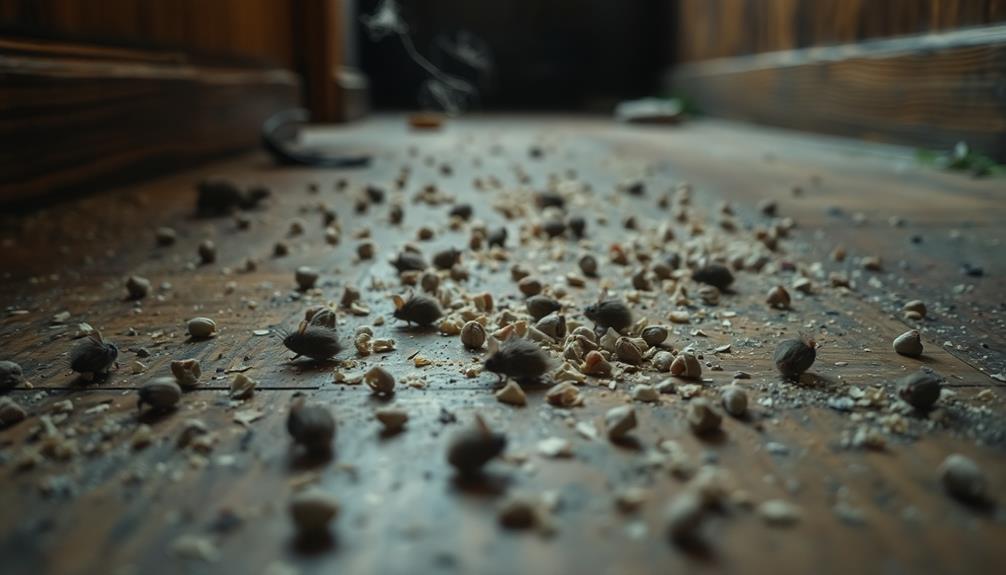
Recognizing the source and composition of mouse droppings helps you understand why they produce such a strong odor. Mouse droppings have an ammonia-like odor, which becomes more intense as they dry out. This smell often signals a mouse presence in your area. The droppings contain undigested food particles, which can accumulate and add to the foul smell. Fresh mouse droppings usually appear shiny and dark, while older droppings turn dull and gray. As they age, the smell becomes even more pronounced.
The intensity of the odor correlates directly with the size of the infestation. A larger population of mice produces more droppings, generating a stronger, more unpleasant odor.
Additionally, decomposing mouse droppings can contribute to these unpleasant odors, especially if they're hidden in hard-to-reach areas. This decomposition process can amplify the smell, making it even more crucial for you to identify and address the issue quickly.
Typical Scenarios or Environments
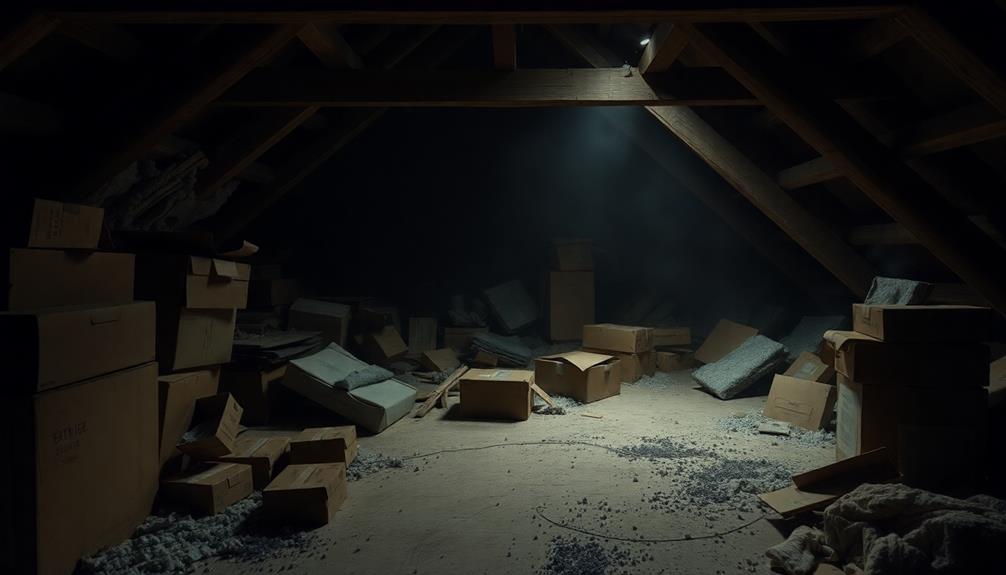
In various environments, the presence of mouse droppings can be particularly telling, especially in confined spaces like cupboards, attics, and basements. You might notice a strong ammonia-like odor that signals an active infestation. This smell can become even stronger if there are nesting sites nearby, where mice use shredded materials to create cozy homes.
Kitchens and food storage areas are critical spots to inspect. If you smell something foul or musty, it might be due to mouse droppings mixing with food contamination. It's essential to act quickly, as these areas are vital for maintaining cleanliness and safety in your home.
Regular inspections are a must to catch any signs of trouble early. Look for droppings accompanied by other odors, like a musky or fishy smell, which could indicate where mice have been active.
Emotional or Cultural Associations
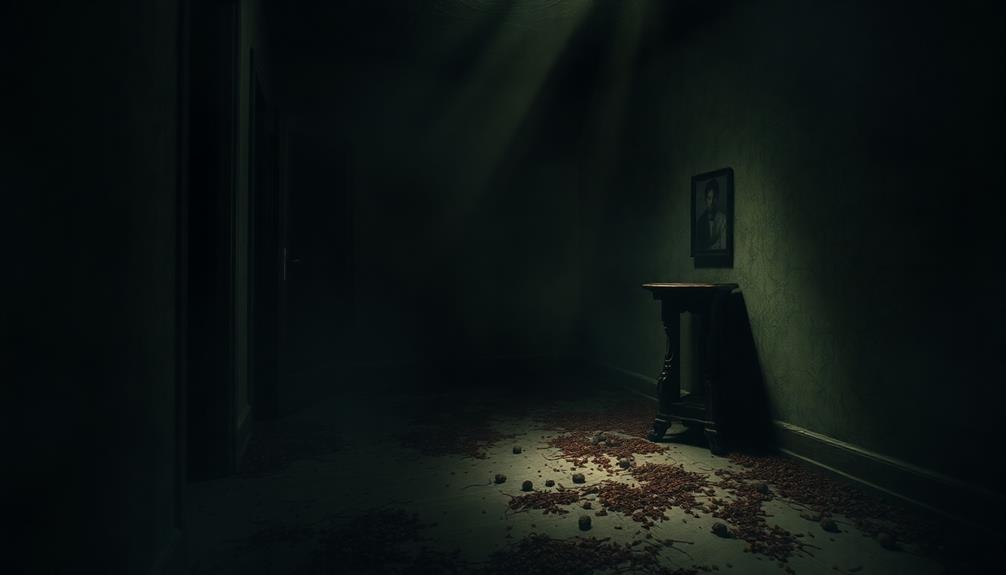
Frequently, the smell of mouse droppings evokes strong emotional reactions, ranging from disgust to anxiety. That ammonia-like odor can trigger immediate concern about cleanliness and potential health risks. You might feel a rush of urgency when you detect this unpleasant scent, prompting thoughts about pest control measures.
It's not just about the smell; cultural associations also play a role. Many cultures view mouse droppings as signs of neglect and poor maintenance, which can create social stigma for those dealing with infestations.
These emotional responses can be especially intense for individuals who've a strong aversion to rodents. The presence of mouse droppings might make you feel anxious or fearful, as they're often linked to uncleanliness and disease transmission. Historically, people have seen mouse droppings as omens of bad luck or pestilence, reinforcing the negative feelings many experience.
Ultimately, when you encounter the smell of mouse droppings, it's not just about the nuisance; it's about how it makes you feel and the cultural beliefs that surround it. Recognizing these emotional connections can help you address the issue more effectively and restore a sense of safety in your space.
Health or Safety Considerations
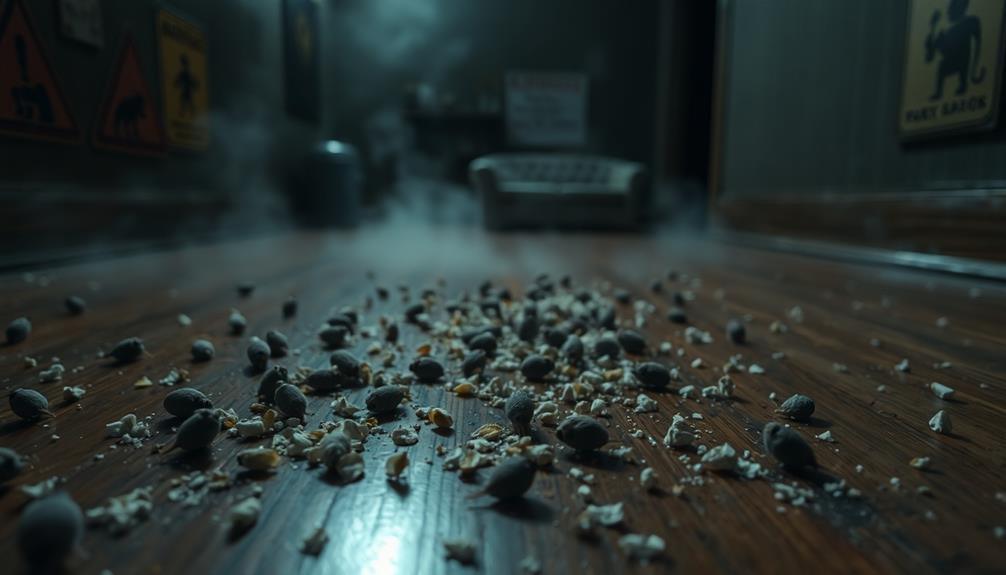
The presence of mouse droppings poses significant health and safety risks that shouldn't be ignored. These droppings can emit a strong ammonia-like smell, especially when mixed with nesting materials. This smell often indicates an infestation, which can lead to unsanitary conditions in your home.
Inhaling particles from dried mouse droppings can cause serious respiratory issues and may expose you to harmful diseases like hantavirus and salmonella.
When you notice that foul smell, it's crucial to take action immediately. Start by wearing protective gear, such as masks and gloves, to keep yourself safe during cleanup. This gear will help minimize your exposure to harmful pathogens.
Remember that cleaning up mouse droppings isn't just about getting rid of the mess; it's about protecting your health and your family's well-being.
If you find a large amount of droppings, consider contacting pest control professionals to handle the infestation safely.
Always prioritize your safety and health when dealing with mouse droppings, as the risks involved can be quite serious. Taking these precautions can help ensure a healthier living environment for everyone.
Final Thoughts
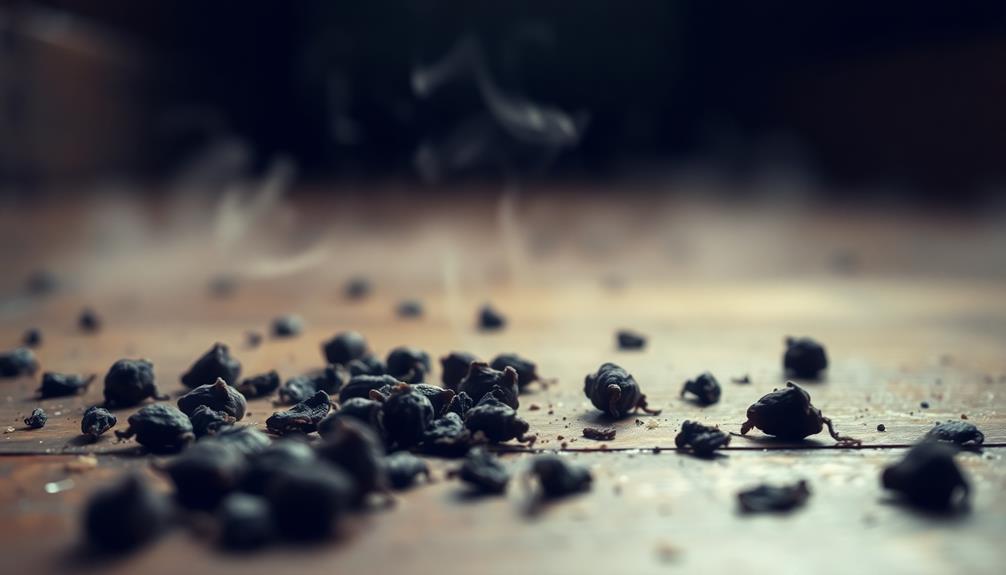
Addressing the issue of mouse droppings shouldn't be taken lightly, as neglecting the problem can lead to serious health risks. The strong ammonia-like smell from mouse droppings often signals an infestation. When you notice this odor, it's crucial to take action quickly.
The intensity of the smell increases with the size of the infestation, so pay close attention to areas where you might find droppings or urine.
Don't forget that nesting materials can also contribute to unpleasant odors. A musky or fishy scent might mean you need further investigation. If you detect any foul smells, it could even be from decomposing mice, which requires immediate attention.
Regular inspections in your kitchen and hidden spaces are key for spotting potential mouse activity and preventing infestations.
To keep your home safe, practice good prevention techniques. Seal entry points, keep food stored properly, and maintain cleanliness.
By staying alert to the signs of mouse droppings and their accompanying odors, you can protect your environment and ensure a healthier living space.
Frequently Asked Questions
Does Mouse Poop Have a Scent?
Yes, mouse poop does have a scent. You'll notice a strong ammonia-like odor, particularly when it's fresh. If you're cleaning areas with droppings, be prepared for an unpleasant smell that can linger.
How Do You Know if You Have Mouse Poop?
To know if you've got mouse poop, look for small, dark pellets in corners or along walls. You might also notice a strong smell or find nests made of shredded materials nearby. Check thoroughly!
What Does a House With Mice Smell Like?
If you've got mice in your house, you'll likely notice strong ammonia-like odors from their urine, a musky smell from nesting materials, and potential decomposition scents if any mice die in hard-to-reach places.
Can You Smell Mice Pee?
Yes, you can smell mice pee. It often has a strong ammonia-like odor, especially in enclosed spaces. If you notice this smell, it's crucial to investigate further for signs of an infestation. Identifying the smell of mice urine can be an important first step in determining whether you have a rodent problem. Along with the distinct ammonia scent, you may notice other signs such as droppings, chewed wires, or food packaging. If left unchecked, a mouse infestation can lead to serious health risks and damage to your property, so addressing it promptly is essential.

